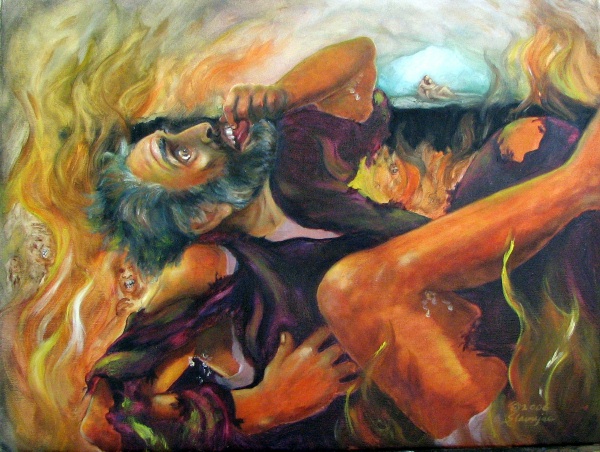
Central Idea: The just try to see that everyone receives the good that is due to them. Doctrine: The preferential option for the poor. Practical Application: The corporal and spiritual works of mercy.
For Lectionary 138, click here.
Central Idea: The just try to see that everyone receives the good that is due to them
Reading 1 Am 6:1a, 4-7
Thus says the LORD the God of hosts:
Woe to the complacent in Zion!
Lying upon beds of ivory,
stretched comfortably on their couches,
they eat lambs taken from the flock,
and calves from the stall!
Improvising to the music of the harp,
like David, they devise their own accompaniment.
They drink wine from bowls
and anoint themselves with the best oils;
yet they are not made ill by the collapse of Joseph!
Therefore, now they shall be the first to go into exile,
and their wanton revelry shall be done away with.
- The Assyrian empire is about to destroy Israel. Yet the powerful among the Chosen People engage in wanton luxurious revelry. So they will be the first to go.
Responsorial Psalm Ps 146:7, 8-9, 9-10
R. Praise the Lord, my soul! or Alleluia.
Blessed he who keeps faith forever,
secures justice for the oppressed,
gives food to the hungry.
The LORD sets captives free.The LORD gives sight to the blind.
The LORD raises up those who were bowed down;
the LORD loves the just.
The LORD protects strangers.The fatherless and the widow he sustains,
but the way of the wicked he thwarts.
The LORD shall reign forever;
your God, O Zion, through all generations. Alleluia.
- Justice is the possession of a good due to one.
- It is right to have something you ought to have, that you have the right to have.
- It is right to render to another person what you owe him or her.
- It is right to help someone, who does not have what he or she ought to have, to secure that good.
- How does God secure justice for the oppressed? In other words, how does God give to those who are deprived the good due to them? How do the hungry receive food, hostages get freedom, the blind gain sight, the heavily burdened get relief, strangers receive protection, the orphan and widow obtain sustenance?
- God does it through just human beings. The just are those who do these things. This is why God loves them. They are like God who keeps faith forever.
- Jesus Christ, God-made-man, did these things par excellence and he has taught the members of his Church to do the same—and they have.
- God will also give the ultimate reward or punishment to us for the good or evil we have done or suffered.
Reading 2 1 Tm 6:11-16
But you, man of God, pursue righteousness,
devotion, faith, love, patience, and gentleness.
Compete well for the faith.
Lay hold of eternal life, to which you were called
when you made the noble confession in the presence of many witnesses.
I charge you before God, who gives life to all things,
and before Christ Jesus,
who gave testimony under Pontius Pilate for the noble confession,
to keep the commandment without stain or reproach
until the appearance of our Lord Jesus Christ
that the blessed and only ruler
will make manifest at the proper time,
the King of kings and Lord of lords,
who alone has immortality, who dwells in unapproachable light,
and whom no human being has seen or can see.
To him be honor and eternal power. Amen.
- Paul tells Timothy (and so us) the same thing in four different ways: pursue virtue; compete well for the faith; lay hold of eternal life; keep the commandment. This is the same as Christ saying, “Strive to enter by the narrow door” (Lk 13:24).
- Our salvation and sanctification in Christ are gifts, yet we receive or reject them by our actions. These actions are moral in nature: either obeying the moral law or rejecting it. The wicked are human beings who do evil, rejecting the moral law by their actions. The just are human beings who make the effort to do what is right.
Alleluia Cf. 2 Cor 8:9
Though our Lord Jesus Christ was rich, he became poor,
so that by his poverty you might become rich.
- Through the merits of Christ, we can become rich in graces, if we want to be.
- We can also imitate Christ in becoming poor, by using our natural and supernatural gifts in service to our neighbor.
Gospel Lk 16:19-31
Jesus said to the Pharisees:
“There was a rich man who dressed in purple garments and fine linen
and dined sumptuously each day.
And lying at his door was a poor man named Lazarus, covered with sores,
who would gladly have eaten his fill of the scraps
that fell from the rich man’s table.
Dogs even used to come and lick his sores.
When the poor man died,
he was carried away by angels to the bosom of Abraham.
The rich man also died and was buried,
and from the netherworld, where he was in torment,
he raised his eyes and saw Abraham far off
and Lazarus at his side.
And he cried out, ‘Father Abraham, have pity on me.
Send Lazarus to dip the tip of his finger in water and cool my tongue,
for I am suffering torment in these flames.’
Abraham replied,
‘My child, remember that you received
what was good during your lifetime
while Lazarus likewise received what was bad;
but now he is comforted here, whereas you are tormented.
Moreover, between us and you a great chasm is established
to prevent anyone from crossing who might wish to go
from our side to yours or from your side to ours.’
He said, ‘Then I beg you, father,
send him to my father’s house, for I have five brothers,
so that he may warn them,
lest they too come to this place of torment.’
But Abraham replied, ‘They have Moses and the prophets.
Let them listen to them.’
He said, ‘Oh no, father Abraham,
but if someone from the dead goes to them, they will repent.’
Then Abraham said, ‘If they will not listen to Moses and the prophets,
neither will they be persuaded if someone should rise from the dead.’”
- In the Parable of the Rich Man and Lazarus, the problem with the rich man was not his wealth. The parable does not say he became rich dishonestly (although he may have). His problem was that he didn’t “listen to,” that is, obey, Moses and the prophets. He did not repent of his sins, obey the law, and love God above all and his neighbor as himself. One example of this is the way he ignored his fellow Jew and therefore his neighbor, Lazarus, who sat at his door begging.
- The rich man received good things during his life. He lived like the rich diners that Amos decries. He did nothing for those in need around him. In the parable, God rewards him with torment.
- Lazarus received during his life what was bad—poverty and illness—like the unfortunates the Psalm says God helps. God rewards Lazarus with comfort in the “bosom of Abraham” for his endurance of suffering on earth.
- Through this parable, Our Lord is saying his message continues the message of Moses and the prophets. If we won’t love God and neighbor, we won’t listen to Christ, even if he does something stupendous, like raise men from the dead or rise from the dead himself.
Doctrine: The preferential option for the poor
- The preferential option for the poor is the special love that Christians—in imitation of Christ—show to those in any need.
- Christ showed a special love for people who were poor, oppressed, and outcast in any way.
- In Luke 4:18, Christ quoted Isaiah in saying he had come specifically to “preach good news to the poor . . . release to captives . . . recovering of sight to the blind . . . [and] liberty to those who are oppressed.”
- This does not mean that Christ condemns wealth.
- How could he? In his divine nature, Christ possesses every good. In his human nature he did not have original sin and his intellect and will were perfect.
- Even during his public ministry, he had wealthy and generous friends that he loved.
- Rather, he condemns the hoarding of wealth and neglect of the poor.
- The actual phrase “preferential option for the poor” was coined when in 1968, the superior general of the Jesuits, Fr. Pedro Arrupe, spoke of the “option for the poor,” and the bishops of Latin America further developed the idea as a “preferential option for the poor.”
- According to CCC 2448, anyone experiencing human misery—for example, those suffering material deprivation, unjust oppression, physical and psychological illness, and death—are the poor.
- Christ’s response to human misery was compassion, including willingly taking on suffering himself (CCC 2448).
- The Church has a preferential love for the poor because the Church imitates her founder’s compassion toward the poor by working “for their relief, defense, and liberation through numerous works of charity” (CCC 2448).
Practical Application: The corporal and spiritual works of mercy
- The misery that human beings experience can pertain to either the body or the soul. This is the reason for the traditional enumeration of two kinds of works of mercy, corporal and spiritual. These are acts of charity through which we can help everyone receive goods due to them because of their dignity as persons.
- The corporal works of mercy are:
- To feed the hungry;
- To give drink to the thirsty;
- To clothe the naked;
- To harbor the harborless (this can mean to give someone asylum and to shelter the homeless);
- To visit the sick;
- To ransom the captive (this can mean to free slaves and to visit those in prison and persons homebound);
- To bury the dead.
- The spiritual works of mercy are:
- To instruct the ignorant;
- To counsel the doubtful;
- To admonish sinners;
- To bear wrongs patiently;
- To forgive offenses willingly;
- To comfort the afflicted;
- To pray for the living and the dead.
- Among the spiritual works of mercy perhaps the most critical today is the first, to instruct the ignorant. Perhaps the most difficult, because we are most afraid of it, is to admonish, that is correct, sinners.
- A key consideration for each of us is our own attitude toward all the material and spiritual goods we hold in our hands: whether our hands will be open or closed when it comes to others.
The Homiletic Directory recommends the following catechism points and themes for this week’s homily:
- CCC 1939-1942: human solidarity
- CCC 2437-2449: solidarity among nations; love for poor
- CCC 2831: hunger in world; solidarity; prayer
- CCC 633, 1021, 2463, 2831: Lazarus
- CCC 1033-1037: Hell

Leave a Reply